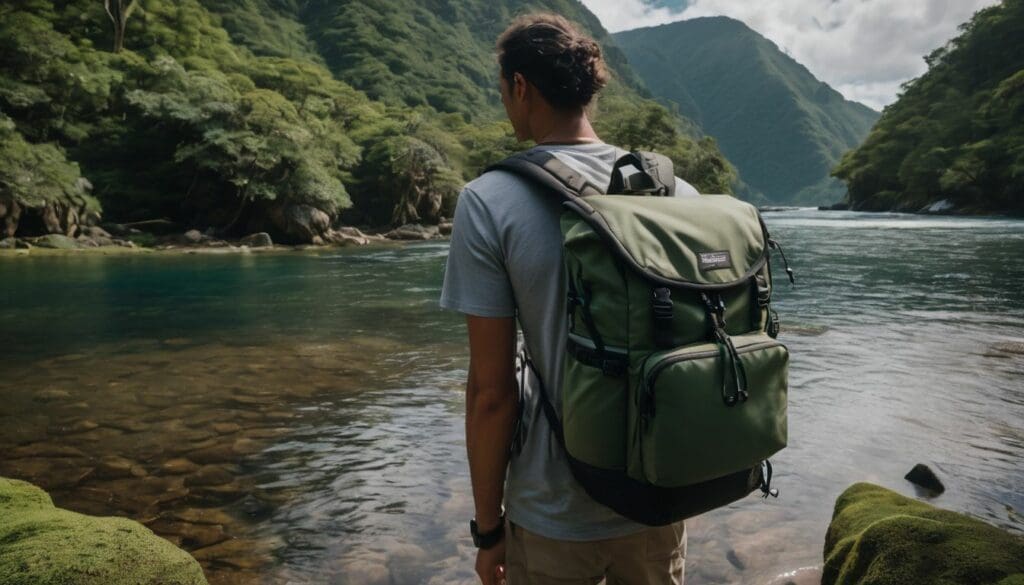Embarking on the adventure of travel can be incredibly exciting, and yet we’re aware it can carry a certain weight when considering our planet’s health. We empathise – making sustainable choices isn’t always straightforward.
Did you know, though? Embracing sustainable tourism doesn’t just give Mother Earth a breather but also contributes to 10% of global GDP! That’s why our diligently carried out research has birthed this guide; to effortlessly weave sustainability into your journey’s tapestry.
So let us share with you how simple shifts can significantly impact the way we see the world – preserving its beauty for generations of travellers yet to come.
Key Takeaways
- Sustainable tourism is essential for local economies and the environment, contributing to 10% of global GDP.
- Choosing eco – friendly travel options like public transportation and supporting local businesses can reduce waste, pollution, and combat climate change.
- Training programmes for sustainable tourism provide valuable knowledge on responsible travel practices that benefit communities and preserve cultural heritage.
- Upcoming sustainability conferences offer opportunities to engage with industry experts and stay updated on the latest trends in responsible tourism.
- Planning responsibly involves using resources wisely, from selecting sustainable accommodations to engaging in community-based activities that respect the planet.
The Importance of Sustainable Tourism
Sustainable tourism is vital for empowering local communities, combating climate change, and reducing waste and pollution. It creates economic benefits for those in need while preserving the environment for future generations to enjoy.
Benefits for local communities
We see firsthand how sustainable tourism boosts the local economy by creating jobs that rely on preserving natural and cultural heritage. It encourages us to invest in local businesses, which means more of our travel spending stays within the community.
This approach fosters pride among residents, as they showcase their traditions and ways of life to visitors from around the world.
Our support for ecofriendly travel options directly contributes to infrastructure improvements that benefit both tourists and inhabitants. We help fund projects like clean water initiatives and renewable energy installations, which improve quality of life while also reducing environmental impact.
By choosing responsible travel practices, we’re part of a global effort that values not just scenic beauty but also the people who call these destinations home.
Combatting climate change
To combat climate change, consider the environmental impact of your travel choices. Opt for eco-conscious transportation methods like trains or buses, and choose accommodations with strong green initiatives.
Engage in sustainable activities such as reef-safe snorkelling or wildlife conservation projects during your trip. Support local communities by purchasing goods from small businesses and participating in eco-tourism experiences that promote conservation efforts.
Contribute to environmental preservation by reducing single-use plastics while travelling, supporting carbon offset programs, and making environmentally responsible dietary choices.
Empowering communities
Local communities can benefit greatly from sustainable tourism, as it provides them with economic opportunities and supports the preservation of their cultural and natural heritage.
By embracing sustainable travel practices such as supporting local businesses, respecting local customs, and participating in community-led initiatives, travellers can contribute to the empowerment of these communities.
This enables them to have a direct positive impact on the livelihoods of locals and helps preserve their unique ways of life. Engaging with communities in this way fosters a sense of mutual understanding and respect, creating a more enriching experience for both tourists and locals.
Reducing waste and pollution
After empowering communities, it is essential to focus on reducing waste and pollution while travelling. We can actively contribute by choosing eco-friendly transportation options, packing sustainably, and minimising waste and resource use during our trips.
By being mindful of our choices, such as using reusable water bottles and shopping bags, we can significantly reduce the environmental impact of our travels.
Living sustainably while abroad is crucial in minimising the ecological footprint. Being aware of local recycling practices and supporting businesses that prioritise sustainability also play a vital role in reducing waste and pollution.
Sustainable Tourism Training
Explore available programmes, read testimonials from past participants, and learn how to get involved and stay informed about sustainable tourism. Read more to discover how you can become a part of the movement towards responsible travel!
Available programmes
We have compiled a list of available programmes for sustainable tourism training:
- Sustainable Tourism Online Course – Explore this comprehensive course to gain in-depth knowledge and practical skills for sustainable travel.
- Sustainable Travel Best Practices Certification – Enroll in this program to learn about green travel, ethical considerations, and eco-conscious travel tips.
- Environmental Awareness Workshops – Participate in workshops that focus on raising awareness about responsible and sustainable tourism practices.
- Delivering Sustainable Travel Conference – Attend this conference to connect with industry experts and learn about the latest trends and initiatives in sustainable travel.
Testimonials from past participants
We received glowing feedback from past participants who completed our sustainable tourism training programmes. They expressed their appreciation for the valuable insights and practical knowledge gained, emphasising the positive impact it has had on their travel practices.
Many remarked that they now feel more confident in making eco-conscious choices while exploring new destinations, thanks to the tips and tools provided during the seminar. Participants also commended the interactive nature of the training, which allowed them to connect with like-minded individuals and share ideas for responsible travel.
The testimonials echoed a common sentiment of empowerment and motivation to continue promoting sustainable tourism within their communities. Some even shared inspiring stories of how they have successfully influenced friends and family members to adopt greener habits when travelling.
Ways to get involved and stay informed
To get involved and stay informed about sustainable travel, consider the following:
- Join online communities focused on sustainable travel to connect with like-minded individuals, share ideas, and stay updated on the latest initiatives and opportunities.
- Attend sustainable travel conferences, workshops, and seminars to gain knowledge, network with experts, and learn practical tips for incorporating sustainability into your travel plans.
- Engage with environmental organisations that promote responsible tourism and conservation efforts, volunteer for local clean-up projects or community-based initiatives in destinations you visit.
- Stay informed by subscribing to newsletters, blogs, and publications dedicated to sustainable travel, featuring inspiring stories, expert insights, and practical advice for ethical and eco-conscious travel.
- Follow social media accounts of influencers, organisations, and responsible tourism advocates who share valuable resources, insights, and success stories related to sustainable travel.
Planning for Sustainable Travel
When it comes to planning for sustainable travel, there are a few key things to consider. From transportation options and packing sustainably to living sustainably while abroad, there are many ways to minimise waste and resource use during your travels.
It’s important to also take into consideration dietary needs and choices when planning for sustainable travel.
Transportation options
When planning sustainable travel, it’s essential to consider environmentally friendly transportation options. Here are some effective ways to minimise your carbon footprint while getting around:
- Explore public transport such as buses, trams, and trains. These options reduce individual vehicle emissions and support local infrastructure.
- Opt for walking or cycling whenever possible. Not only does this minimise environmental impact, but it also allows you to engage with the local community and surroundings.
- Carpool with fellow travellers or use ridesharing services to reduce the number of vehicles on the road, contributing to lower emissions and fuel consumption.
- Choose eco – friendly rental vehicles that have low CO2 emissions or utilise electric or hybrid models.
- Seek out destinations that are pedestrian – friendly, reducing the need for motorised transportation altogether.
Packing sustainably
When packing for sustainable travel, we ensure to consider the environmental impact of our choices. Here are some tips for packing sustainably:
- Choose eco – friendly luggage made from recycled materials or sustainable fibres.
- Pack reusable toiletry containers to reduce single-use plastic waste.
- Opt for clothing made from organic and sustainable materials, and pack versatile pieces to minimise the need for excessive items.
- Bring a reusable water bottle and filter to reduce plastic bottle waste while travelling.
- Use eco – friendly laundry detergent or hand wash clothing with biodegradable soap instead of using hotel laundry services.
- Pack light to reduce fuel consumption during transportation and minimise your carbon footprint.
- Consider bringing a foldable tote bag for shopping and souvenirs, reducing the need for single – use plastic bags.
- Avoid overpacking by planning outfits ahead of time, eliminating unnecessary items that add weight and take up space in your luggage.
- Pack solar-powered chargers or portable power banks to reduce reliance on disposable batteries while on-the-go.
- Use silicone storage bags or beeswax wraps instead of disposable plastic bags for snacks and food storage during your travels.
Minimising waste and resource use
Living sustainably while abroad
- Opt for eco – friendly accommodations that prioritise energy conservation, waste reduction, and support local communities.
- Choose to walk, bike, or use public transport instead of renting a car to reduce carbon emissions and support sustainable transportation initiatives.
- Pack reusable water bottles, shopping bags, and eco-friendly toiletries to minimise single-use plastic consumption.
- Consume locally sourced foods to support the community and reduce the carbon footprint associated with importing goods.
- Respect cultural traditions and wildlife by following ethical guidelines for interacting with local communities and natural habitats.
- Engage in volunteer opportunities or community-led initiatives to contribute positively to the destination’s environment and social welfare.
Considerations for dietary needs and choices
When living sustainably whilst abroad, it’s essential to consider dietary needs and choices. Ensuring that the food you consume aligns with sustainable practices can have a positive impact on the environment. Here are some considerations for environmentally conscious individuals when it comes to dietary needs and choices:
- Local Cuisine: Opt for locally sourced and indigenous dishes to support the local economy and reduce carbon emissions associated with transportation.
- Plant-Based Options: Embrace plant-based meals whenever possible to reduce the environmental footprint of your diet and support sustainable farming practices.
- Sustainable Seafood: If consuming seafood, choose sustainably sourced options certified by organisations like the Marine Stewardship Council to protect marine ecosystems.
- Minimising Food Waste: Be mindful of portion sizes, avoid excessive food waste, and support establishments that prioritise food waste reduction efforts.
- Ethical Food Practices: Seek out restaurants and vendors that adhere to ethical animal welfare standards and promote fair trade for agricultural products.
- Reusable Utensils: Carry reusable utensils or straws to minimise single-use plastic waste when dining out or getting takeout.
- Responsible Drinking Choices: Choose beverages from sustainable producers, avoid single-use plastic bottles, and support eco-friendly packaging initiatives.
Responsible Tourism for a Better Future
Conscious social interactions and engaging with local communities are essential for responsible tourism. Stay informed about upcoming sustainability conferences and resources for responsible travel planning to make a positive impact on the environment and local communities.
Conscious social interactions
- Respect local customs and traditions when interacting with people.
- Support local businesses and artisans to promote sustainable economic development.
- Engage in meaningful conversations with locals to understand their perspectives on environmental issues.
- Participate in community-based activities such as beach clean-ups or tree planting initiatives to contribute positively to the environment.
- Seek opportunities to volunteer or collaborate with local conservation organisations during your travels.
Upcoming sustainability conferences
We’re excited to share with you some upcoming sustainability conferences in the field of responsible and sustainable tourism. These events provide a platform for like-minded individuals to connect, learn, and collaborate on making positive changes within the travel industry. Here are some noteworthy sustainability conferences coming up:
- Sustainable Travel Summit: This conference brings together experts, practitioners, and advocates in the sustainable travel arena to discuss innovative approaches and best practices for responsible tourism.
- Green Tourism Forum: Focusing on eco-conscious travel strategies, this forum offers workshops and discussions on promoting green travel initiatives and minimising environmental impact.
- Ethical Travel Conference: This event delves into the ethical considerations surrounding travel, including cultural sensitivity, fair trade practices, and community engagement in tourist destinations.
- Eco-Tourism Expo: A showcase of sustainable travel examples and experiences that highlight conservation efforts and nature-based tourism options around the world.
- Sustainable Travel Certification Workshop: A practical workshop aimed at educating participants about obtaining sustainable travel certifications for businesses or destinations, emphasising transparency and accountability.
- Responsible Tourism Symposium: This symposium explores ways to integrate responsible tourism principles into destination management plans, fostering collaboration between stakeholders for sustainable development.
Resources for responsible travel planning
- Sustainable Travel Websites: Explore websites that offer tips and resources for eco-conscious travel, such as sustainabletravel.org and ecotourism.org.
- Eco-friendly Accommodations: Look for eco-conscious hotels, hostels, and lodges that prioritise sustainability in their operations and promote environmental conservation.
- Green Travel Guides: Utilise green travel guides that provide information on sustainable destinations, eco-friendly activities, and responsible tourism practices.
- Carbon Offsetting Platforms: Consider using carbon offsetting platforms to compensate for the carbon emissions produced during your travels by supporting renewable energy projects or reforestation initiatives.
- Ethical Wildlife Experiences: Seek information from reputable sources about ethical wildlife experiences and responsible animal encounters to ensure your activities align with conservation efforts.
- Sustainable Tour Operators: Choose tour operators that emphasise sustainable practices, support local communities, and engage in environmentally friendly tourism initiatives.
Ways to take action and make a positive impact
When planning sustainable travel, we can support local communities by choosing ecoconscious accommodations and services that respect the environment and benefit the people living there.
By participating in community-based tourism activities, we can directly contribute to economic empowerment and cultural preservation. We should also prioritise visiting destinations with responsible tourism initiatives that aim to protect natural habitats and endangered species, ultimately making a positive impact on the environment.
To make a positive impact while travelling sustainably, we can educate ourselves about the cultures and customs of the places we visit. It’s important to be respectful of local traditions and show consideration for social interactions.
Conclusion
In conclusion, planning a sustainable travel seminar is crucial for promoting responsible tourism. By learning about the importance of sustainable tourism and participating in training programmes, individuals can make a positive impact on local communities and the environment.
When considering responsible travel options, from transportation to packing and social interactions, we empower ourselves to contribute to a better future through ecoconscious travel choices.
Taking action by attending sustainability conferences and utilising resources for responsible travel planning allows us to play an active role in creating a more sustainable world for all.
FAQs
1. What is a Sustainable Travel Seminar?
A Sustainable Travel Seminar educates people about travelling in ways that protect the environment and support local communities while exploring sustainable travel destinations.
2. Why is planning for sustainability important in travel?
Planning for sustainability ensures your trips have a minimal environmental impact, supports ecoconscious travel practices, and benefits local economies.
3. Can anyone attend travel sustainability conferences?
Yes, these conferences welcome everyone who’s interested in learning how to plan their adventures more responsibly and gather sustainable travel tips.
4. What should I pack for a sustainable trip?
For a sustainable trip, pack light with eco-friendly items; choose reusable containers and biodegradable products to reduce waste during your travels.





